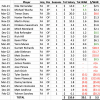I was ambivalent about Chaim when I responded to the poll although I do think he deserves more time. I then spent some time crunching the numbers on all of his roster moves, and I found some interesting takeaways.
1. Chaim is generally value-added. Looking at all of free agent acquisitions, waiver wire moves and trades over his three year tenure shows that he has added value (as measured by WAR) to the major league roster, even on a net basis. He's added total WAR of 38 at an average cost of $4.4 million per WAR (he's spent $167 million in payroll for that 38 WAR). In comparison, players that he's jettisoned via trade or outright release have generated total WAR of 16 at an average cost of $5.8 million per WAR (he's shed $93 million in payroll for that 16 WAR). So, that's something.
2. Where Chaim shines is off the waiver wire. Not only has he had three notable successes here already (Whitlock, Arroyo, Schreiber), but he's also got a reasonably low failure rate (4 of 13) on waiver wire pickups that make the major league roster. His ability to date to add value to the roster on the margins at minimal cost is outstanding. His waiver work has generated total WAR of 9 at an incredible average cost of only $1.0 million per WAR.
View attachment 57269
3. Chaim generally takes a beating from Red Sox faithful for the Mookie Betts trade. But that trade doesn't look quite as bad through the numbers if you are willing to concede that Mookie would have left via free agency anyway (he had turned down multiple offers from the Sox already) and you consider the relative cost and remaining years of control of the players involved at the time of the trade. I think Chaim deserves to be let off the hook for this specific criticism even if he didn't make up the 4+ of average annual WAR that made its way to the Dodgers.
View attachment 57272
4. Chaim's grade for his full body of work on the trading front is mixed, mostly because he got absolutely pantsed in the JBJ-Renfroe deal by taking on $17.5 million in salary commitments to make the major league roster worse. One common theme from his trading track record is an apparent tendency to overvalue the "call option" aspect of multiple lottery pick prospects coming back in trades. This seems to be borne out in not only the Betts and Renfroe trades, but also the Benintendi and Ottavino transactions. The jury is still out on Wong, Downs, Binelas, Hamilton, Winckowski and German, but I suspect Chaim would love do-overs in all of those instances. The Pivetta and McGuire deals offer some small consolation, but Bloom's hit ratio on trades is disappointing.
View attachment 57274
View attachment 57275
View attachment 57276
5. On the free agency front, Chaim has been generally cautious in doling out large, multi-year commitments. His average cost of roughly $5.5 million per WAR has been in line with his trade work. This isn't surprising given the salary cap constraints that have existed until this point in his tenure. It might not make some of the posters here very happy, but Chaim might be best served continuing to focus on shorter-duration, sub $10M AAV deals where he's seen some success (Kike, Wacha, Renfroe, Refsnyder). And none of his failures in that price range (Garrett Richards, Jake Diekman, Kevin Plawecki) have really hamstrung the team meaningfully or for very long.
View attachment 57277
6. I'd love to know what role, if any, Cora played in the Renfroe-JBJ, Marwin Gonzalez and Benintendi transactions, and whether his opinion and or affection/disaffection with any of those players helped sway Chaim into making an ultimately-suboptimal transaction. Are those failed moves 100% on the front office or does Core deserve some responsibility for his evaluation of four guys he had managed or coached?






